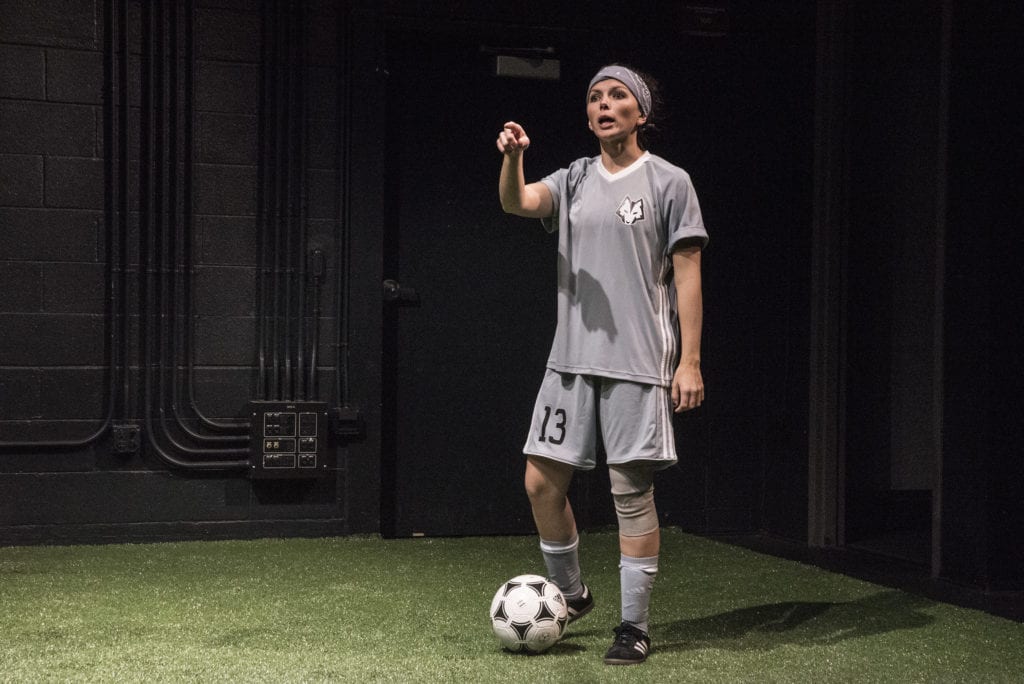
Boulder Ensemble Theatre Scores With The Wolves
by Juliet Wittman, Westword Magazine (Read the original.)
In this regional premiere of Sarah DeLappe’s The Wolves, a Pulitzer finalist staged by the Boulder Ensemble Theatre Company, we meet nine teenage girls, all soccer players, and watch them before and between games. Seated in a semi-circle, a few of them discuss the genocide in Cambodia: Some are studying the situation in school, since this is 2014 and one of the perpetrators, Nuon Chea, has just been convicted by the Khmer Rouge Tribunal. Their thoughts are fragmentary, unfocused, yet occasionally unexpectedly insightful; meanwhile, two of their teammates are talking about menstruation, one mocking the other because she still wears pads.
For a while, it’s hard to remember which character is which in this roughly ninety-minute piece. While defining characteristics pop up at intervals, they’re not often demonstrated or elaborated upon. Sometimes these details are tantalizing: Why does number 46 live in a yurt — or a yogurt, as another girl calls it? And if she’s been to Cambodia, as she states, does that mean she has some specific knowledge of the country’s blood-soaked history? She seems to be poor. She’s new to the team, inexperienced at the game and takes three buses to get to practice. Another girl says she’s stinky. It turns out that her eccentric mother is a travel writer. What can we piece together out of these fragments?
DeLappe is getting at something profound, however, because the killing fields of Cambodia are not the only atrocity mentioned. Another girl, a perfectly regular American kid, has Armenia in her background. The subject of children from Central America penned into cages at the United States border comes up. Abu Ghraib gets a mention, and someone has been assigned a paper on Rwanda; the players wonder whether they should take their liberties in this country for granted. These topics are filtered through the girls’ colossal ignorance, but also lit by their genuine curiosity, the innocent, offbeat questions they pose. What is guilt? What if Nuon Chea honestly thought what he was doing was necessary to save his country? Besides, why sentence him to life in prison now that he’s in his nineties?
Most of the conversation is far more down to earth, however. There are injuries and puzzling parents; the current coach, whom the players dislike; speculation about who’s going to play what position, as well as squabbles, serious and fleeting. When tragedy eventually occurs, it’s ordinary and has nothing to do with the great currents roiling the world, but it pierces far more deeply for these teenagers.
There’s no straightforward narrative to The Wolves, and only a kind of elliptical climax. The play feels like a slice of life, but the rhythms are enthralling and sophisticated, and I can’t remember when I’ve seen the lives of young girls portrayed with such realism, understanding and sympathy — sympathy for their inane frivolity and fits of meanness as well as their bursts of generosity and understanding. And soccer is a crucial part of the drama. The girls stretch, pass the ball, practice footwork, rush off stage and into the action. The rhythms of the sport underlie the rhythms of their speech and interactions.
Rebecca Remaly’s direction is brilliant, subtle and flawless; she has found actors athletic enough for the roles, and their work is beautifully integrated to create a strong ensemble. The Wolves may withhold information, avoid the obvious, come at important topics sideways, yet it’s profoundly satisfying. You’re never bored while you watch, and the experience creeps up on you afterward, when you realize you were privileged to enter a world that seemed quite ordinary and then see it quietly illuminated.
